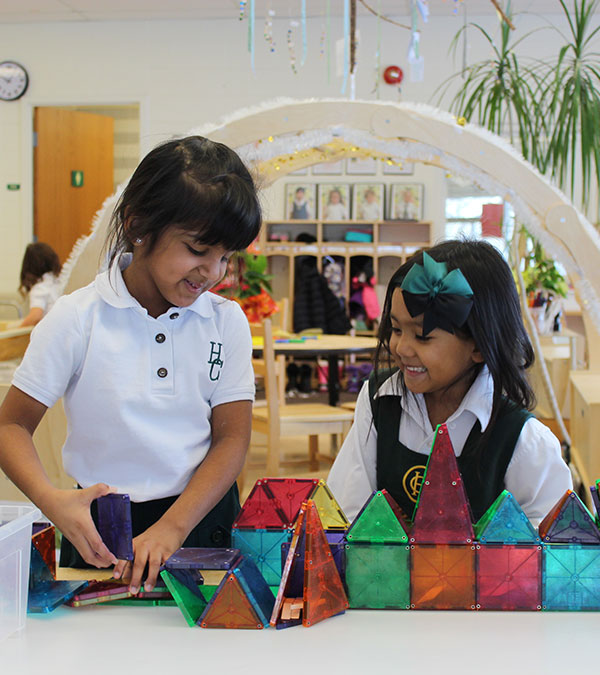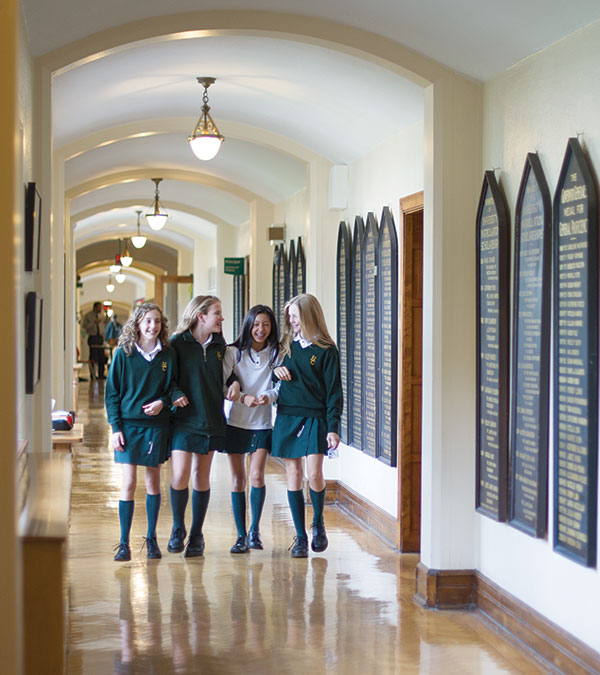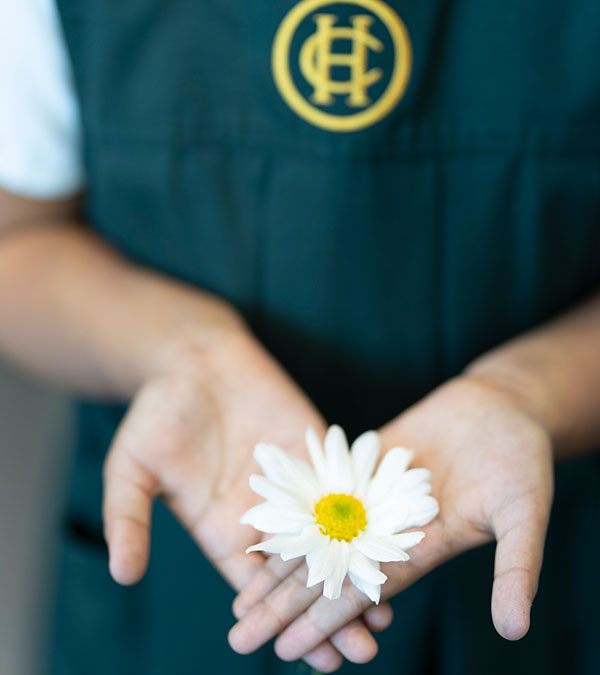Inside Havergal
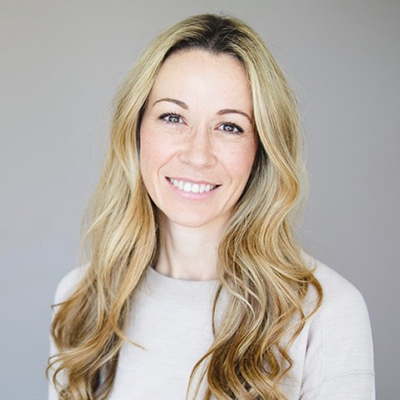
Principal’s Message
Katrina Samson
After the excitement of back to school, we have settled into routines again, which is a welcome change after the last year. While our campus is still full of energy and optimism, we’re aware that increasing workloads and shorter days are on the horizon and we want to ensure that wellbeing remains a priority at Havergal.
Wellbeing is essential to learning, and there is scientific support for Positive Education—a model that marries the science of positive psychology with the best practices in teaching and learning. If you’re new to wellbeing science, start with this article on Martin Seligman’s PERMA model and the key factors that promote flourishing. Inspired by the research on the importance of wellbeing, I have spent the last five years deeply invested in understanding and applying the science of wellbeing to schools. This year, I am excited to join Havergal on this journey.
With the same focus we approach the teaching of mathematics and literacy, schools can—and should—commit to teaching practices that improve wellbeing. At Havergal, we’re dedicated to bringing intentional, researched-backed focus to wellbeing for our students, staff and faculty.
Over the coming months, you’ll hear more about Havergal’s wellbeing framework and our multi-pronged approach. November 22 to 26 is Thrive Week—a week focused on the education and promotion of wellbeing. On Monday, November 22, Upper School Prayers guest speaker and alum Kendra Fisher (Class of 1998) will share her personal journey on mental health as she brings this topic to the forefront.
We look forward to engaging with our community to help you learn, ask questions and understand how we are supporting your child’s wellbeing.
Katrina
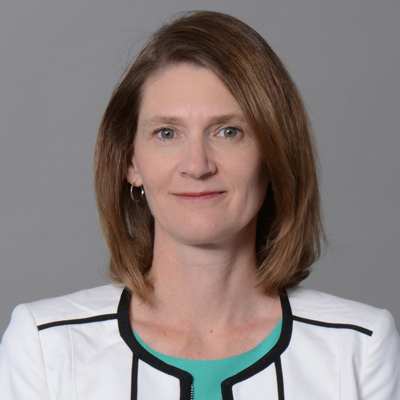
Message from the Board of Governors
Diane Jeffreys, Chair of the Financial Sustainability Committee
The Financial Sustainability Committee is a committee of the Board of Governors. Our primary mandate is to safeguard the long-term financial sustainability of Havergal College. As incoming Chair of the Financial Sustainability Committee, I have the pleasure of working in partnership with an engaged group of volunteers, as well as Havergal’s Chief Operations Officer Laura Sims and Executive Director of Finance Johann McCormack.
Our committee members include current and past parents, Old Girls and senior leaders in the community. We look to involve a mix of individuals with a wide range of backgrounds and financial experience. This provides the opportunity to bring a diverse perspective to discussions and broad insights in support of the financial decisions the school makes.
This past year has brought with it the need to be agile, and the Committee has supported the school in responding to the changes that had to be made throughout the pandemic. I am proud of our faculty, staff and Senior Leadership Team for their dedication to delivering a Havergal education amid ever-changing circumstances.
As students are coming back to what feels like a closer return to normal—enjoying the additional space that the new builds have provided and a return to many co-curricular and athletic activities—the Financial Sustainability Committee is working with the Campus Management and Resource Development Committee, and the Leadership of Havergal, to ensure that the financial plans are in place to support the long-term strategic direction of the school.
Working with the school’s Chief Operating Officer, Executive Director of Finance and other senior leaders, we continue to focus on overseeing and monitoring Havergal’s financial plan, both short and long-term. This involves balancing the interests of multiple stakeholders including students, parents, staff and faculty, and—like all good financial plans—is a balancing act requiring careful consideration of a series of trade-offs. The topics that we regularly discuss include:
- Tuition fees and the balance between staying competitive with our peer schools and meeting the financial needs of the school to deliver quality education and programs.
- Capital spending that invests in the campus to maintain and enhance our facilities in support of our strategy and programs.
- Short and long-term financial plans and the funding required to support the wide variety of programs that are fundamental to the student experience at Havergal.
I am happy to report, as the Chair of the Financial Sustainability Committee, that Havergal continues to be financially strong, benefiting from a disciplined, responsible and thoughtful approach to fiscal responsibility.
Diane
This Month

A Focus on Wellbeing
Meagan Yarmey, Director of Wellbeing
Although much has been written about wellbeing there is no single, agreed-upon definition. Many definitions refer to the presence of positive emotions (e.g. happy) and the absence of negative emotions (e.g. sad), as well as a sense of satisfaction with one’s life. Other interpretations suggest that the fulfillment of three psychological needs (autonomy, competence and relatedness) are the foundation of individual wellbeing. Flourishing, a term often used interchangeably with wellbeing, means to live within an optimal range of human functioning, encompassing qualities such as goodness, generosity, growth and resilience. As you can see, there are many different definitions to wellbeing and thus different approaches.
What all the researchers agree on is that there is growing evidence that children’s wellbeing and achievement are positively associated. Student wellbeing, engagement and academic success are intertwined with gains in one area dramatically benefiting the other two. Our strategic approach to student wellbeing at Havergal College unites the development of both academic achievement and wellbeing into one comprehensive complementary pursuit. We have been designing and implementing a whole-school approach to wellbeing where we focus on wellness connected to academics in our day-to-day academic curriculum and co-curricular programming. Across grade levels, learning is happening within caring, empathetic and responsive environments with the overarching goal of developing cognitive and emotional resources for our students so they can be flexible and efficient learners. At the same time, they are gaining personal insight and awareness, honing lifelong social skills and building their resiliency mindsets by gaining greater self-confidence and agency to make positive life choices.
Our emphasis on supporting wellbeing extends beyond the dedicated time in the Junior School and Form Advisory in the Upper School through special speakers, programs and activities. One such activity is the upcoming Thrive Week (November 22 to 26). Working alongside the Wellbeing Prefects and student leaders, the Wellbeing department has planned keynote speakers on resilience and positive mental health. Over the week, students will be exploring “five golden rules” of helping a friend in distress as they learn more about mental health and wellbeing. The five golden rules are as follows: Say What You See; Show You Care; Hear Them Out; Know Your Role; and Connect to Help. As we continue to develop our understanding of the relationship between wellbeing and academic success, we will adjust our programming to support our students as they move through the grades. Our end goal is to have students who are academically successful and flourishing in all aspects of their lives.
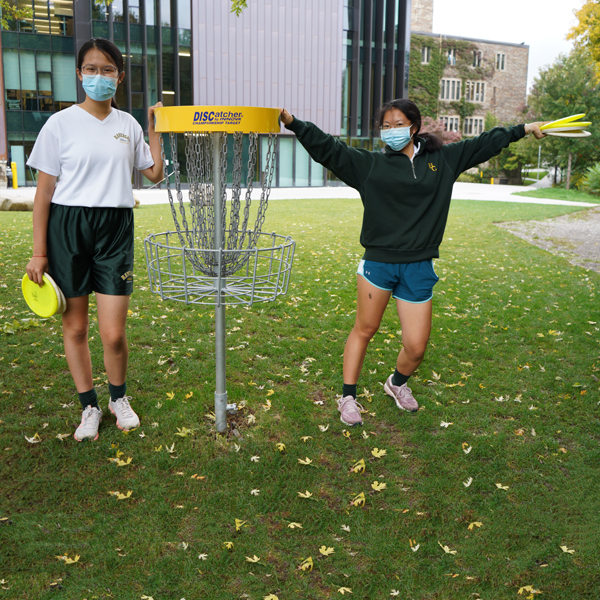
Athletics Return to Havergal
US Athletic Director Carla DiFilippo and JS Athletic Director Anna Bartlett
Athletics at Havergal are keeping our students active this term. Junior School students have a wide range of athletic co-curricular opportunities scheduled during the school day and there are many before and after school athletic programs for students in Grades 3 to 6. In the fall, teams include Soccer, Basketball, Cross Country and Jump Rope. These teams are developing lifelong physical skills and are enjoying being competitive amongst each other.
In the Upper School there has been a smooth transition back to competitive sports through the Conference of Independent Schools Athletic Association (CISAA). On top of our traditional sports, we’ve added a few new offerings such as tennis instruction and disc golf. This fall, our Rowing team participated in the Head of the Trent and we had more than 80 students participate in our fall Learn to Row Program. It’s been a gift to watch our athletes take to the fields again!
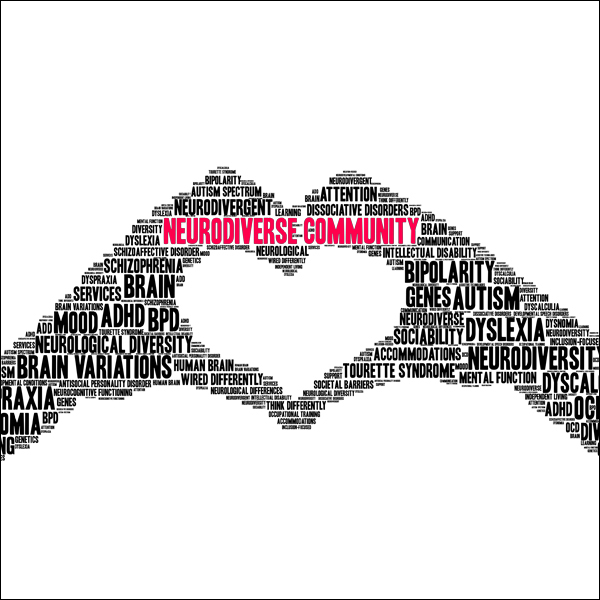
Encouraging Confidence and Nurturing Agency
The Learning Support Team
The Learning Support Team recognizes the individuality of each student and knows that every student learns in different ways. We aim to develop self-knowledge in students as learners as we encourage confidence and nurture their agency. We support every student to be their own person, challenge themselves and celebrate successes.
The Learning Support Team works in collaboration with faculty, families and clinical service providers to monitor student growth and provide interventions and accommodations that target specific learning and social/emotional needs. They consult with teachers to effectively differentiate their instruction for all students, provide individualized interventions for some students and support the implementation of accommodations for students with Individualized Education Plans (IEPs).
In the Junior School, early and intensive interventions are provided to students who may require additional support to meet grade level learning objectives. When students transition into the Middle School, the focus shifts to proactively supporting students through strategies designed to build their executive functioning skills, study skills and self-advocacy skills. As students move into the Senior School and prepare for post-secondary education, they build self-advocacy skills, develop an individualized toolkit of assistive technology and refine their executive functioning skills.
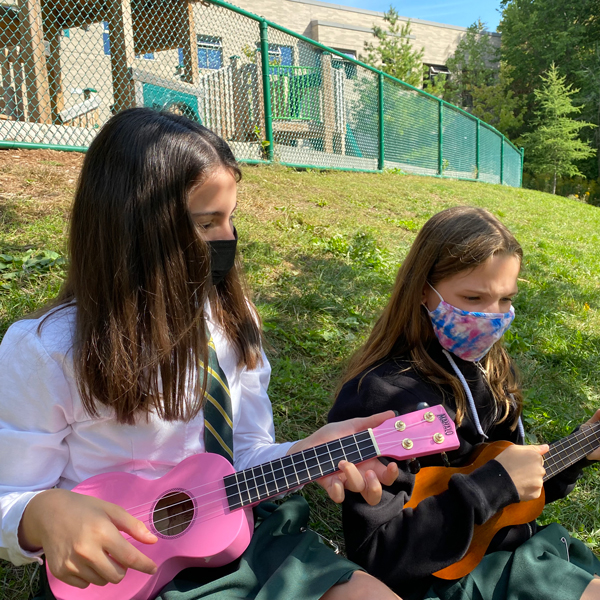
Creative Engagement Through The Performing Arts
Cissy Goodridge, Director of Performing Arts
The Performing Arts are alive and well at HC! This fall, the Junior School is running several arts programs including: Drama, Learn to Play Band, Steelpan Drumming and Dance. Students have enjoyed returning to their private music lessons, which are being held in our new music practice rooms. This multipurpose room has given the students a wonderful space to practise with their ensembles. In the coming weeks, we look forward to giving you a virtual glimpse of what they have been learning.
In the Upper School, we have welcomed new and returning students to all Performing Arts Programs. Whether it’s singing in the choir, playing an instrument or learning a dance or a new character, you will find students rehearsing before and after school each day. They are enjoying engaging in their passions while connecting with their fellow performers. In-person private music instruction is available to students who are interested in learning new skills or improving their current skills.

The Upper School Guidance Program
Heather Johnstone, Head of Guidance
We are fortunate at Havergal College to have a team of six skilled and experienced Guidance Counsellors who work with other members of the Wellbeing Team to support our students’ needs within the Upper School. The Guidance Program is typically delivered through the Wednesday Form and Advisor Time in the morning and includes age and stage appropriate content on key topics relevant to students around course planning, university planning, managing relationships, social/emotional learning, executive function skills and transition skills.
Alongside the group sessions, counsellors often meet one-on-one with students to address specific needs and questions they may have. In Grades 7, 8 and 9, counsellors arrange meetings throughout the year in addition to students always being able to book their own time by emailing their counsellor or stopping by the office. In Grades 10 and 11, we push students to be self-starters and to seek these meetings when they have questions. For students who do not come in on their own, we invite them for a check-in.
We really want to create a sense of self-advocacy in our students as some require a lot of support while others are very content and capable of navigating the school landscape and do not wish to come in often. Our hope is that, by Grade 12, students are working with the resources that are put in front of them, working alongside their Guidance Counsellor and navigating their final year feeling confident in their own capacity and ability to seek answers to questions they may have of their counsellors. This will prove to be a very necessary skill for them as they transition to university the following year. Each grade has a Guidance class page on their Veracross Portal. This class is visible to parents and contains the information that was covered that week as well as any other relevant, guidance-related information (for example, the Grade 11 and 12 portal has a calendar of university admissions information sessions designed for senior students; the Grade 9 and 10 page provides some downloadable organizational resources and planners).
Guidance Counsellors are always available to the students in this building to help with everything from the day-to-day problems common to all teenagers to the navigation of specific, individual problems or questions students have. It is important for students to reach out and, likewise, if parents have a concern or question, the Guidance Team is always happy to answer those queries directly on the phone, over email or (hopefully someday soon) in person.

Relational, Social and Emotional Support
By Katelyn Kitson, MSW RSW (she/her), Upper School Social Worker
As the Upper School Social Worker, I have the privilege of getting to work alongside, learn from and support students in the Havergal community. My role includes providing students with short-term counselling to support them with any relational, social and/or emotional concerns that may be affecting their wellbeing and mental health and/or impacting their ability to learn and excel at school. For example, I might support young people in developing their coping skills to better manage stressful day-to-day circumstances, which can manifest as anxiety and/or depression symptoms.
Alongside this targeted work, I work with students to help them gain insight into and strengthen peer and family relationships. I have the unique privilege of learning about the strengths, narratives, insights and knowledge of our students on a daily basis. Students often come to see me when they feel they need a safe and confidential space to explore their emotions, in addition to learning new strategies and tools to support them in navigating various experiences. When appropriate, I help direct students to community resources and/or referrals to counselling/clinical professionals within the GTA for ongoing and longer-term support.
In my social work practice, I draw upon attachment-centred, narrative therapy, trauma-focused and cognitive behavioural modalities. I deeply value prioritizing relationship-building while supporting young people in finding their worth and recognizing their strengths. Overall, I am incredibly passionate about fostering safe, secure and empowering relationships with students and am grateful to be a part of the Havergal community.

Learning and Growing Through DEI
“The strength and beauty of Havergal lies in our ability to authentically value and systemically serve the pluralistic identities of our students and staff,” explained Diversity, Equity and Inclusion (DEI) Manager Ms. Raagini Appadurai at Upper School Prayers on Monday, October 4.
Highlighting that pursuing DEI and social justice at Havergal means that the school community commits to being constant “learners and unlearners every day,” Ms. Appadurai has worked with faculty to create spaces for dialogue and action through Affinity Groups, Alliance Groups and Brave Spaces designed for Upper School students. “For these groups to be impactful and serve their intended need, the learning around identity, intersectionality and discrimination for everyone in the community (not just those who are racialized or marginalized) must be ongoing.”
- Affinity Groups are safe spaces for individuals who share a common identity or an aspect of their identity (usually one that is marginalized or non-dominant) to gather and talk about issues and experiences related to that identity.
- Affinity Groups include:
- Black Students Affinity Group (BSA)
- Asian Students Affinity Group (ASA)
- Black, Indigenous and People of Colour (BIPOC) Students Affinity Group
- Muslim Students Affinity Group (MSA)
- Jewish Students Affinity Group (JSA)
- Affinity Groups include:
- Alliance Groups are spaces where people who share a common commitment to those who hold marginalized identities can gather to learn, engage in dialogue and mobilize action toward addressing the issues that impact them. These groups are for everyone.
- Alliance Groups include:
- Diversity Committee (DC)
- Gender & Sexuality Alliance (GSA)
- Alliance Groups include:
- Brave Spaces are educational opportunities that encourage dialogue and learning. They recognize difference and intersectionality, and hold each person present accountable to do the work of listening, sharing experiences and coming to new understandings together. Brave Spaces are for everyone, and usually organized by those engaged in Affinity and Alliance group conversations who want to extend the dialogue to the larger HC community.
Ms. Appadurai encourages everyone to be a part of these opportunities. “We hope that the Havergal community is proud and excited to be a part of a school that is committed to learning how to better care for all its students in the ways they need so that we can thrive together,” she says.
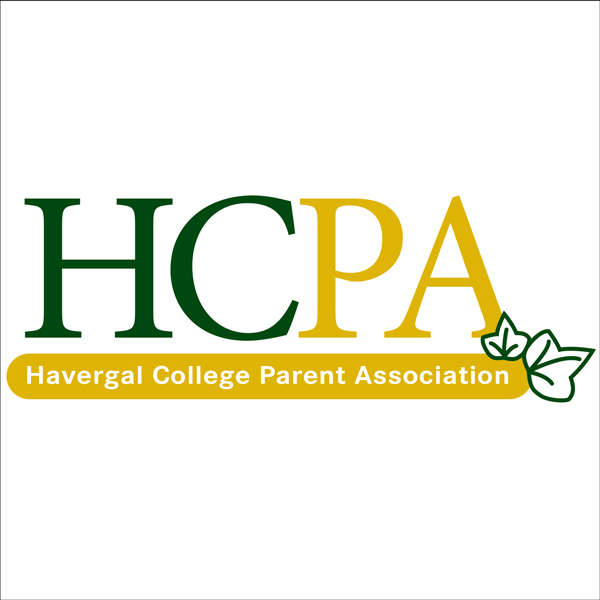
HCPA Fundraising—How and Why
In a spring edition of Inside Havergal, we shared some of the reasons behind our support of the school’s mission and Strategic Direction through our fundraising initiatives.
Our multi-year pledge in support of the Limitless Campaign is a continuation of our partnership, helping the school to foster an environment in which our daughters develop the skills needed to thrive in the future and keep pace in a rapidly-changing world. We have designated part of our gift toward student financial assistance as a way to help make a Havergal education more accessible.
We would like to share some of the ways that we will be fulfilling our mandate this year. In addition to traditional fundraisers such as the Used Textbook Return and sales of Havergal branded items on our Marketplace (including the much loved Havergal Lazypants), we are pleased to introduce new online fundraisers to complement our efforts.
FlipGive
With FlipGive, the HCPA offers Havergal “Friends and Family” the opportunity to buy e-gift cards and/or and purchase everyday items from over 700 retail brands. Popular brands include: Starbucks, Best Buy, Esso, Sportchek, Sephora and Apple.
FlipGive will give a percentage of every purchase you make to the HCPA. Use this link to raise funds for HCPA FlipGive. Please note: you do not have to sign up with FlipGive to purchase gift cards or shop online.
Indigo FUNraiser
We are pleased to introduce the HCPA Indigo FUNraiser. This is the perfect way to shop for the book lover on your list as well as to stock up on specialty items that make great host/hostess gifts. In case you need some inspiration, Havergal’s Librarians have shared their recommended reading lists with us!
Kick-off your holiday shopping at Indigo by using this link to shop for books, toys, gifts and games for the whole family. A percentage of purchases made using this link will go towards the HCPA fundraising goals.
HCPA Holiday Marketplace—Coming Soon!
Given the success of our Holiday Marketplace last year, we have decided to reprise the Holiday Giving Made Simple sale. Watch for further details in upcoming communications—you won’t want to miss this opportunity to purchase specially-curated gift items for everyone on your holiday list.
Inside Focus
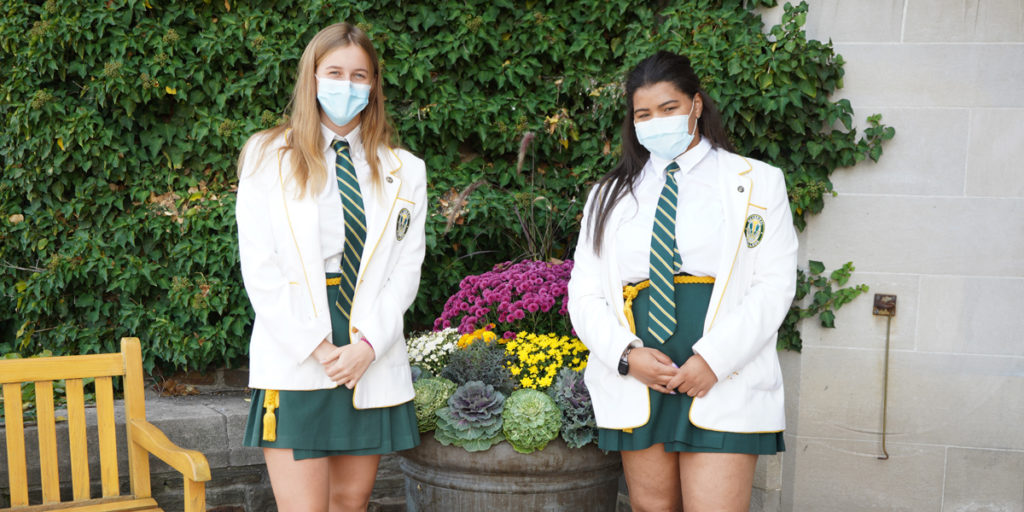
Bringing New Tools and Resources to Student Wellbeing
Erin and Hillary, Wellbeing Prefects
Hey Havergal! We’re Erin and Hillary, this year’s Wellbeing Prefects. Wellbeing is not only a key part of our school experience, but also part of our everyday lives. Coming off a year that posed so many new challenges for students, now is the perfect time to reflect on how we address wellbeing as a school. We are so excited to work with our amazing Wellbeing Team to bring new tools and resources to help everyone on their journey of learning so that we can thrive as individuals and as a community. With inclusion in mind, we are hoping to reach every student, staff and faculty member.
We are so grateful to see an overwhelming amount of support for our initiatives by the community thus far. Our mission this year is to build upon raising awareness, which will lead us to take real action—bringing forth assistance and solutions to support everyone’s mental health. By working with both staff and students, our plan is to find a balance between a challenging and thought-provoking curriculum and enjoyable learning experiences. We hope that this self-inspired approach will allow people to learn what works best for them as individuals when it comes to their personal wellbeing. Hopefully we can all leave Havergal with lifelong tools and coping mechanisms to take a proactive approach to any challenges we may face. Mental health is important for everyone!
Meet Our Faculty & Staff
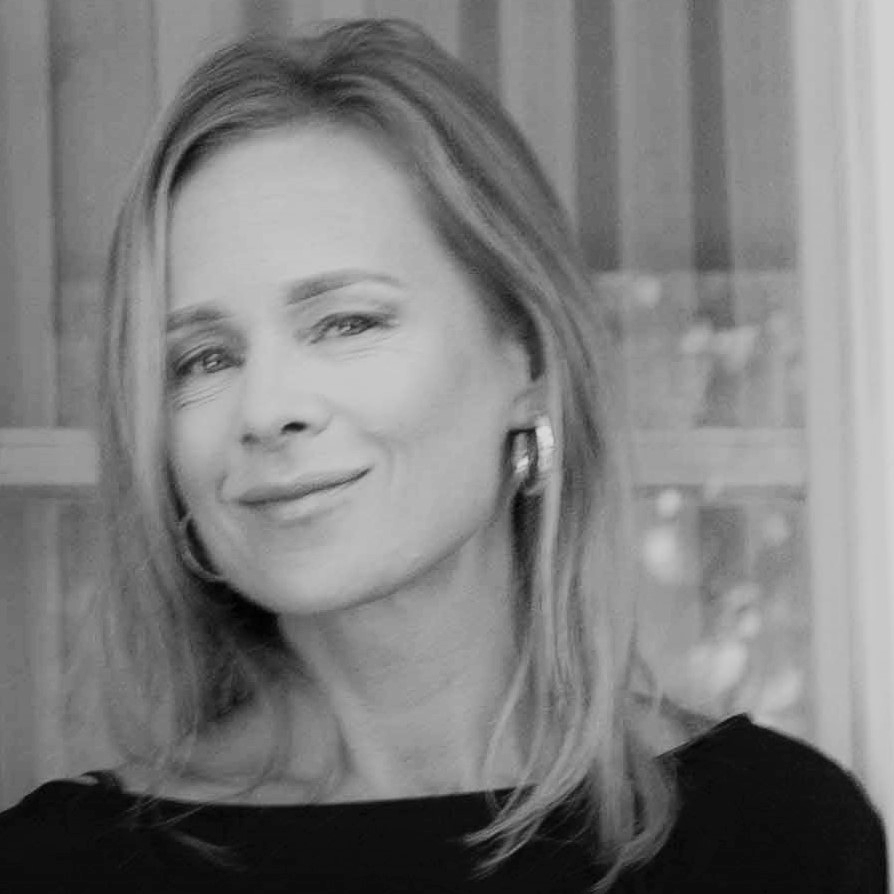
Dr. Meagan Yarmey
Director of Wellbeing
Dr. Yarmey is an insightful clinician, researcher and educator with more than 20 years of experience in higher education and the private sector. Her background includes research and evaluation, health promotion and clinical treatment, and various leadership capacities within the mental and behavioural health and wellbeing sector. In addition to a PhD in Social Psychology from York University, her academic credentials include a Master’s of Social Work in Clinical Social Work from Wilfrid Laurier, a Master’s degree in Community Psychology from the University of Toronto (OISE) and a Bachelor of Arts in Psychology from the University of Guelph.
In her most recent role as Lead, Content Development, Mental Health Literacy Certificate at the University of Waterloo, Dr. Yarmey led the content development, implementation, monitoring and evaluation framework for the campus-wide Mental Health Literacy Certificate. She was also a Counsellor at the University of Waterloo providing crisis, single session, individual and group psychotherapy to undergraduate and graduate students. Her exemplary research background, combined with extensive subject matter expertise and experience, positions her to integrate wellbeing research and practice within our school setting.

